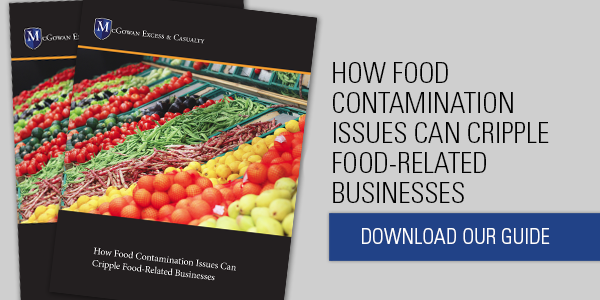A food allergen contamination causes major legal and financial trouble for businesses along the entire food supply chain. For food processors, contamination can lead to costly recalls, lost product, and incalculable damage to reputation. Proper mitigation procedures coupled with comprehensive insurance are the best defense.
Food processors have little room for error when it comes to preventing allergen contamination in their products. The most circulated media stories involve food allergen contaminations at dining establishments, but food processors face great exposure during intake, processing, and labeling. As shown in the following stories, mistakes can be deadly:
- Last May, a 19-year-old college student from Pennsylvania died from a severe allergic reaction to food he consumed at a Chinese restaurant. He had a known peanut allergy and ordered what he believed to be a peanut-free dish, but within hours of eating the meal, he died from cardiac arrest.
- Another tragedy occurred in the United Kingdom. A 15-year-old girl died after consuming a baguette at a sandwich shop. The bread was mislabeled. It contained sesame – an ingredient she was allergic to.
Food allergies are growing
Food allergies are a growing concern in the United States. Recent statistics from the Food Allergy Research and Education (FARE) reveal:
- An estimated 15 million Americans suffer from a food allergy
- 9 million (4%) of adults have a food allergy
- 6 million (8%) of children have a food allergy
While allergies can develop from any food, researchers have identified what is known as the Big 8. These eight foods are the most common culprits when it comes to food allergies. They are responsible for 89% of allergic reactions. The Big 8 allergens are:
- Milk
- Eggs
- Peanuts
- Shellfish
- Soy
- Wheat
- Fish
- Tree nuts
A recall or food-related lawsuit due to one of these allergies can easily span into the millions of dollars, far exceeding the limits of many Commercial General Liability (CGL) plans. For this reason, Umbrella coverage is a necessity for many food-related businesses.
Food processors and allergen recalls
Since 2004, potential allergens have been the leading cause of recalls. During the same year, the Food Allergen Labeling and Consumer Protection Act (FALCPA) went into effect, requiring allergens to specifically be listed on product labels. In just the first few weeks of 2019, four food companies have already issued allergen-related recalls.
Most food allergen recalls are caused by improper cleaning of manufacturing machinery or mislabeling of the food product. Even a small amount of a food allergen may cause a dangerous and potentially deadly reaction or force a costly recall.
HAVE A QUESTION? WANT MORE INFORMATION? NEED A QUOTE?
Establishing an allergy prevention plan in food processing
While not foolproof, thorough prevention and training procedures can help your processing business avoid costly mistakes that lead to allergen recalls and lawsuits. Every point of production — including receiving, manufacturing, labelling, and packaging — needs to have allergen prevention processes incorporated within it.
Proper intake procedures: Allergen safety protocols begin with the intake of product into the facility. Look carefully for spilled products or torn or open packages. Ensure suppliers have stringent measures in place to avoid allergen contamination. Store allergen containing food items in a separate area to intake to avoid as much contact with other foods as possible.
Identification and storage of allergen-containing products: Once you have received a food product, it must be appropriately identified and stored. Employ a color coding system in your plant for allergens. Use the designated color to identify the allergen as well as the storage area. Color-coding will minimize the risk of cross-contamination. After all, incorrect labeling is one of the leading causes of food allergen recalls.
Sanitation and cleaning: Processing equipment must be kept to the highest levels of cleanliness. Sanitation begins with the design of the equipment. High-quality stainless steel equipment with smooth surfaces are less likely to trap food particles that may lead to contamination. Cloths, brushes, and other equipment used to clean and sanitize must be laundered and sanitized each time before use.
Proper risk management
The most challenging risk for food processors to make sure of is that all their risks are covered. While set processes and continuous training are necessities for a healthy business, so is proper coverage for any financial risks the company faces. Partner with McGowan for your food processor risks. We specialize in writing Umbrella & Excess Liability products for a broad range of food-related businesses.




